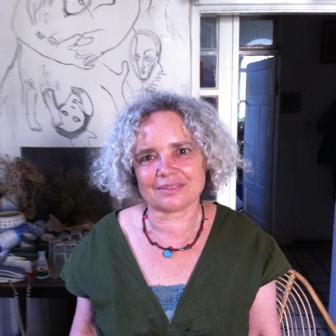Dichter
Rivka Miriam

Rivka Miriam
(Israël, 1952)
© Vered Abutbul
Biografie
When Rivka Miriam’s two-volume Collected Poems was issued in 2011, poet Almog Behar wrote, ‘A thin veil of enchantment stretches over Rivka Miriam’s poetry. You can’t explain it, because that’s how magic works: either it’s inexplicable or the explanation, if it can be made, cancels out the magic’. And indeed, her work may not be reduced to what may be the largest influences on her life, her family's European history and its observant Judaism.
‘It’s worth’, Behar suggests, ‘starting the attempt to discuss her poetry with the poetry itself’, and he goes on to offer us the first poem in her first book, My Yellow Gown, published in 1966 when she was 14:
God was in my room
and the walls were too narrow
so he left my room and fled
into the fields.
Only his scent still resides in me
his finger still imprinted on my forehead
still the absence of his body is in my eye
still echoes in me his
hollow, empty cry.
– ‘STILL’ (trans. Linda Zisquit)
and the walls were too narrow
so he left my room and fled
into the fields.
Only his scent still resides in me
his finger still imprinted on my forehead
still the absence of his body is in my eye
still echoes in me his
hollow, empty cry.
– ‘STILL’ (trans. Linda Zisquit)
‘Here God leaps into her poetry’, Behar writes, ‘the God who visits narrow rooms, but who, upon discovering their dimensions, flees into the fields like the elusive lover of the biblical Song of Solomon. But the poet doesn’t call after him “Hurry, my beloved,/ swift as a gazelle or a young stag,/ to the hill of spices!” (Song of Songs 8:14). And she doesn’t give chase after this figure, but remains in the confines of her room, noting the signs that her beloved God left behind: a scent, a fingerprint, absence and a hollow, empty cry. The poet is marked with the signs of God, and the signs of his absence.’
The poet’s father, Leyb Rochman, was a Yiddish writer, the author of, among other works, a diary he kept while in hiding during the Holocaust (available in English translation as The Pit and the Trap), and a novel available in French, A pas aveugles de par le monde.
According to Margot Lurie writing in The Jewish Review of Books, the poet has said that, ‘When I was a year old and my father would hold me in his arms and throw me up and down and I laughed and laughed and laughed. Each time he threw me up he’d yell in Yiddish “Rivkela Rivkela where’s Savta?” “Killed.” “Rivkela Rivkela where’s Miriam?” “Killed.” “Rivkela Rivkela where’s Chaim?” “Killed.” He’d say all the names and I’d laugh and laugh. I was a year old, I feel I absorbed it from the start’.
It is important to remember, however, as Erez Schweitzer notes in A school of her own (an essay included with this feature and translated for Poetry International by Lisa Katz) that ‘Rivka Miriam is nearly a current all to herself in Israeli poetry, not only because she’s been ahead of her time in many respects (in her religious eroticism, for example, and the surrealism that sometimes runs through her work, which connects, in a natural way, a highly personal self-examination with the culture at large – traditional Jewish culture, in the main)’.
© Lisa Katz, Almog Behar on Ynet 22 March 2011
BibliographyPoetry
Kutoneti hatsehuba (My yellow gown), Akad Press, Tel Aviv, 1966
Tavati ba-holonote (Drowned in the window), Akad Press, Tel Aviv, 1969
Kisaote bamidbar (Seats in the desert), Dvir, Tel Aviv 1973,
Etz nogaya be-etz (Tree touches tree), Dvir, Tel Aviv, 1978
Hakolot likratam (The sounds towards them), Dvir, Te Aviv, 1982
Me-shiray imahote ha-even (Poems of stone mothers), Sifriat Poalim, Tel Aviv, 1987
Makom, Namer (Place, tiger), Carmel, Jerusalem, 1994
Me-karov hiya ha mizrah (The east was near), Carmel, Jerusalem, 1996
Nakh Ha-yehudi (The Jew rests), Carmel, Jerusalem, 2000
Amar Ha-hoker (Said the investigator) Carmel Jerusalem 2005
Baal Ha-nes veh ode orkhay oreakh (Baal Ha-Ness and other passersby), Carmel, Jerusalem, 2006
Avi zivani lo lamoot (My father commanded me not to die), Carmel, Jerusalem, 2007
Baim bayamim (Biblical poems) Carmel Jerusalem 2009
Shiray Rivka Miriam (Collected poems) (in two volumes), Carmel, Jerusalem, 2010
Moshe (Moses), Carmel, Jerusalem, 2013
Tsel ha-shalem (The Shadow of the whole), Carmel, Jerusalem, 2013
Ha af-al-pi (The although), Carmel, Jerusalem, 2014
Short Stories
Rak ha-esh veh ha-maim (Just fire and water), Carta, Jerusalem, 1989
Nafal Davar (It happened), Carmel, Jerusalem, 1996
Petekim (Notes), Reuven Mass, Jerusalem, 2007
Ba-hilufin (In exchange) Carmel, Jerusalem, 2008
Lifnay hanesiya (Before the journey) (illus. Meir Appelfeld), Even Hoshen, Ra'anana, 2011
Children's books
Holonote beheketz (Window dreaming), Hakibbutz Hameuchad, Tel Aviv, 1987
Me-ever la-gvaote hacharonot (Beyond the last hills), Sifriat, Poalim, 1991
Veh gam sipur al mita she-hitahava be-kisay (And a story about a bed that fell in love with a chair), Even Hoshen, Ra'anana, 2008
Lo rak al rurik (Not only Rurik), Carmel, Jerusalem, 2013
In English
These Mountains: Selected Poems of Rivka Miriam (translated by Linda Zisquit), Toby Press, London, 2009
Links
In English
Review The Jewish Forward
Tablet Magazine on the poet’s reading in NYC
Review in The Jewish Review of Books
In Hebrew
Almog Behar on the poet’s Collected works
Profile in the Wiki
Ohio State Lexicon of Contemporary Hebrew Literature
Audio
Podcast on TLV1: On asking forgiveness (in English)
Interview by Anat Sharon-Blais (in Hebrew)
Music video
‘Touching the non-existent’
Sponsored by Poetry Place
Gedichten
Gedichten van Rivka Miriam
Sponsors
























